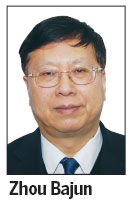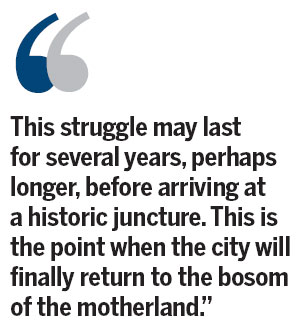Divisions over constitutional reform won't last forever
Updated: 2014-07-16 07:08
By Zhou Bajun(HK Edition)
|
|||||||
On Tuesday, the Task Force on Constitutional Development (TFCD) announced a report on the public consultation concerning the methods for the Chief Executive (CE) election in 2017 and the Legislative Council (LegCo) election in 2016.
The city's leader, Leung Chun-ying, submitted a report to the National People's Congress Standing Committee (NPCSC) requesting clarification as to whether or not these two methods should be revised. Beijing has said the CE can be elected by universal suffrage from 2017 onwards; the LegCo will be elected on the basis of one person, one vote.
So Hong Kong is poised to embrace significant constitutional reforms. However, with the threat of "Occupy Central" hanging over the city, the opposition and pro-establishment camps remain at loggerheads.

Recent developments, such as the release of the white paper on the implementation of the "One Country, Two Systems" principle in Hong Kong, demonstrate that the central government will not change its position. A showdown is looming in Hong Kong.
In an effort to ease tensions a group of "Thirteen Scholars", who believe in universal suffrage, issued a statement on July 11. The statement appealed to the SAR government to delay in presenting the two reports until October. This is to allow time for tensions to ease in the city. The following day two of the scholars published opinion pieces, separately, in two local Chinese language newspapers.
It should be noted, however, that the TFCD report had compiled all the opinions and proposals of Hong Kong people on universal suffrage. In addition the CE's report also included the views expressed during the "Occupy" campaign's "public nomination" as well as those expressed during the July 1 rally.
Nevertheless some members of the opposition camp are still threatening to paralyze Central - the city's financial hub. They may do this earlier than they had originally planned. Moreover on July 10, Reverend Chu Yiu-ming, another "Occupy Central" supporter, said that before the actual "Occupy" campaign is to be launched, a non-cooperation campaign will begin. This will involve strikes at businesses, schools and universities and could start as early as this month.

The opposition camp is intensifying its last-minute efforts. It aims to force the central government into further compromise. Its leaders are apparently still seeking support from overseas. After appealing for US support earlier this year, former chief secretary Anson Chan Fang On-sang and Democratic Party founder Martin Lee Chu-ming flew to London on July 12.
In other developments, the Hong Kong Bar Association released a statement on July 11, warning that the government would "abuse the concept of the rule of law" if it rejects the notion of voters nominating CE candidates. It said the government had to offer more options to ensure a high level of public participation in the electoral process.
The Bar Association also criticized the government for earlier comments by officials who said "public nomination" was incompatible with the Basic Law. The association said, "It would be irresponsible for the government to simply reject (public nomination out of hand), or to recommend that the central authorities disapprove or exclude that proposal on the grounds of non-compliance with the Basic Law - and then do no more about the proposal".
Reading the Bar Association statement, some serious questions come to mind. Where is the rule of law?
When the association said "public nomination" was incompatible with the Basic Law didn't it consider the rule of law? Why did it change its views to allow the opposition's so-called "genuine universal suffrage" at the expense of the Basic Law? The Bar Association has also criticized the white paper over what it alleges is interference in Hong Kong's judicial independence. But, don't forget the SAR's judicial independence can never be used to encourage political acts against Beijing. If this occurs it will contravene a fundamental argument of the Basic Law, which says, "The Hong Kong Special Administrative Region is an inalienable part of the People's Republic of China".
The political situation in Hong Kong may deteriorate further. In the last quarter of the year, the city is likely to experience further conflict over the constitutional reform. It may be impossible to reach a compromise. This struggle may last for several years, perhaps longer, before arriving at a historic juncture. This is the point when the city will finally return to the bosom of the motherland.
The author is a veteran current affairs commentator.
(HK Edition 07/16/2014 page9)